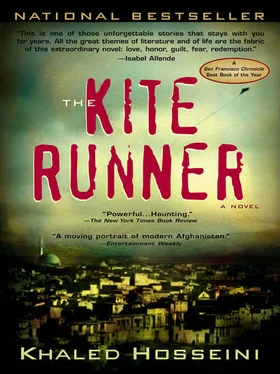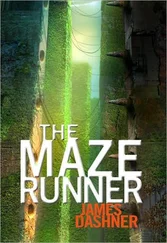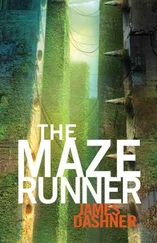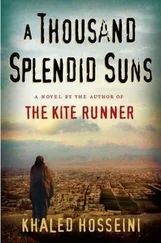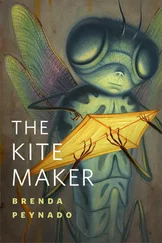He smiled and leaned back against the headrest, his forehead almost touching the ceiling. We didn’t say anything. Just sat in the dark, listened to the tink-tink of the engine cooling, the wail of a siren in the distance. Then Baba rolled his head toward me. “I wish Hassan had been with us today,” he said.
A pair of steel hands closed around my windpipe at the sound of Hassan’s name. I rolled down the window. Waited for the steel hands to loosen their grip.
I WOULD ENROLL in junior college classes in the fall, I told Baba the day after graduation. He was drinking cold black tea and chewing cardamom seeds, his personal trusted antidote for hangover headaches.
“I think I’ll major in English,” I said. I winced inside, waiting for his reply.
“English?”
“Creative writing.”
He considered this. Sipped his tea. “Stories, you mean. You’ll make up stories.” I looked down at my feet.
“They pay for that, making up stories?”
“If you’re good,” I said. “And if you get discovered.”
“How likely is that, getting discovered?”
“It happens,” I said.
He nodded. “And what will you do while you wait to get good and get discovered? How will you earn money? If you marry, how will you support your khanum ?”
I couldn’t lift my eyes to meet his. “I’ll… find a job.”
“Oh,” he said. “ Wah wah ! So, if I understand, you’ll study several years to earn a degree, then you’ll get a chatti job like mine, one you could just as easily land today, on the small chance that your degree might someday help you get… discovered.” He took a deep breath and sipped his tea. Grunted something about medical school, law school, and “real work.”
My cheeks burned and guilt coursed through me, the guilt of indulging myself at the expense of his ulcer, his black fingernails and aching wrists. But I would stand my ground, I decided. I didn’t want to sacrifice for Baba anymore. The last time I had done that, I had damned myself.
Baba sighed and, this time, tossed a whole handful of cardamom seeds in his mouth.
SOMETIMES, I GOT BEHIND the wheel of my Ford, rolled down the windows, and drove for hours, from the East Bay to the South Bay, up the Peninsula and back. I drove through the grids of cottonwood-lined streets in our Fremont neighborhood, where people who’d never shaken hands with kings lived in shabby, flat one-story houses with barred windows, where old cars like mine dripped oil on blacktop driveways. Pencil gray chain-link fences closed off the backyards in our neighborhood. Toys, bald tires, and beer bottles with peeling labels littered unkempt front lawns. I drove past tree-shaded parks that smelled like bark, past strip malls big enough to hold five simultaneous Buzkashi tournaments. I drove the Torino up the hills of Los Altos, idling past estates with picture windows and silver lions guarding the wrought-iron gates, homes with cherub fountains lining the manicured walkways and no Ford Torinos in the driveways. Homes that made Baba’s house in Wazir Akbar Khan look like a servant’s hut.
I’d get up early some Saturday mornings and drive south on Highway 17, push the Ford up the winding road through the mountains to Santa Cruz. I would park by the old lighthouse and wait for sunrise, sit in my car and watch the fog rolling in from the sea. In Afghanistan, I had only seen the ocean at the cinema. Sitting in the dark next to Hassan, I had always wondered if it was true what I’d read, that sea air smelled like salt. I used to tell Hassan that someday we’d walk on a strip of seaweed-strewn beach, sink our feet in the sand, and watch the water recede from our toes. The first time I saw the Pacific, I almost cried. It was as vast and blue as the oceans on the movie screens of my childhood.
Sometimes in the early evening, I parked the car and walked up a freeway overpass. My face pressed against the fence, I’d try to count the blinking red taillights inching along, stretching as far as my eyes could see. BMWs. Saabs. Porsches. Cars I’d never seen in Kabul, where most people drove Russian Volgas, old Opels, or Iranian Paikans.
Almost two years had passed since we had arrived in the U.S., and I was still marveling at the size of this country, its vastness. Beyond every freeway lay another freeway, beyond every city another city, hills beyond mountains and mountains beyond hills, and, beyond those, more cities and more people.
Long before the Roussi army marched into Afghanistan, long before villages were burned and schools destroyed, long before mines were planted like seeds of death and children buried in rock-piled graves, Kabul had become a city of ghosts for me. A city of harelipped ghosts.
America was different. America was a river, roaring along, unmindful of the past. I could wade into this river, let my sins drown to the bottom, let the waters carry me someplace far. Someplace with no ghosts, no memories, and no sins.
If for nothing else, for that, I embraced America.
THE FOLLOWING SUMMER, the summer of 1984 – the summer I turned twenty-one – Baba sold his Buick and bought a dilapidated ’71 Volkswagen bus for $550 from an old Afghan acquaintance who’d been a high-school science teacher in Kabul. The neighbors’ heads turned the afternoon the bus sputtered up the street and farted its way across our lot. Baba killed the engine and let the bus roll silently into our designated spot. We sank in our seats, laughed until tears rolled down our cheeks, and, more important, until we were sure the neighbors weren’t watching anymore. The bus was a sad carcass of rusted metal, shattered windows replaced with black garbage bags, balding tires, and upholstery shredded down to the springs. But the old teacher had reassured Baba that the engine and transmission were sound and, on that account, the man hadn’t lied.
On Saturdays, Baba woke me up at dawn. As he dressed, I scanned the classifieds in the local papers and circled the garage sale ads. We mapped our route – Fremont, Union City, Newark, and Hayward first, then San Jose, Milpitas, Sunnyvale, and Campbell if time permitted. Baba drove the bus, sipping hot tea from the thermos, and I navigated. We stopped at garage sales and bought knickknacks that people no longer wanted. We haggled over old sewing machines, one-eyed Barbie dolls, wooden tennis rackets, guitars with missing strings, and old Electrolux vacuum cleaners. By midafternoon, we’d filled the back of the VW bus with used goods. Then early Sunday mornings, we drove to the San Jose flea market off Berryessa, rented a spot, and sold the junk for a small profit: a Chicago record that we’d bought for a quarter the day before might go for $1, or $4 for a set of five; a ramshackle Singer sewing machine purchased for $10 might, after some bargaining, bring in $25.
By that summer, Afghan families were working an entire section of the San Jose flea market. Afghan music played in the aisles of the Used Goods section. There was an unspoken code of behavior among Afghans at the flea market: You greeted the guy across the aisle, you invited him for a bite of potato bolani or a little qabuli , and you chatted. You offered tassali , condolences, for the death of a parent, congratulated the birth of children, and shook your head mournfully when the conversation turned to Afghanistan and the Roussi s - which it inevitably did. But you avoided the topic of Saturday. Because it might turn out that the fellow across the isle was the guy you’d nearly blindsided at the freeway exit yesterday in order to beat him to a promising garage sale.
The only thing that flowed more than tea in those aisles was Afghan gossip. The flea market was where you sipped green tea with almond kolcha s, and learned whose daughter had broken off an engagement and run off with her American boyfriend, who used to be Parchami – a communist – in Kabul, and who had bought a house with under-the-table money while still on welfare. Tea, Politics, and Scandal, the ingredients of an Afghan Sunday at the flea market.
Читать дальше
